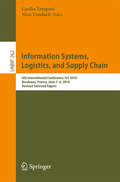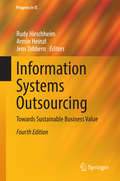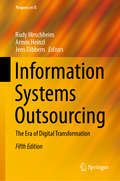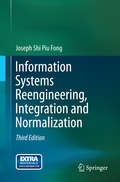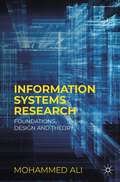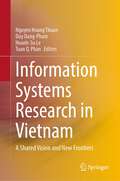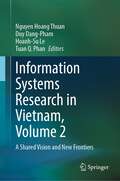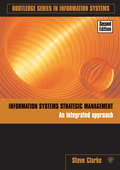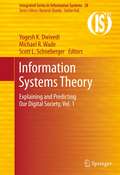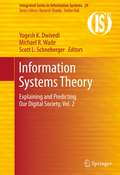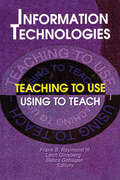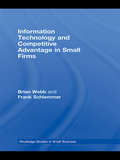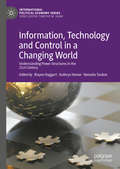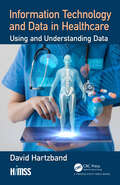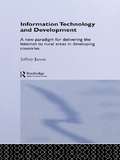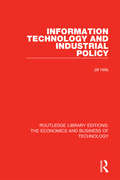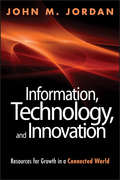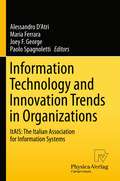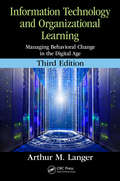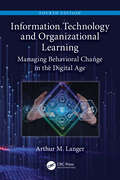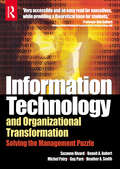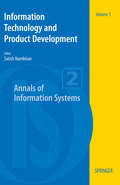- Table View
- List View
Information Systems, Logistics, and Supply Chain: 6th International Conference, ILS 2016, Bordeaux, France, June 1–4, 2016, Revised Selected Papers (Lecture Notes in Business Information Processing #262)
by Cecilia Temponi Nico VandaeleThis book constitutes revised selected papers from the 6th International Conference on Information Systems, Logistics, and Supply Chains, ILS 2016, held in Bordeaux, France, in June 2016. The conference deals with topics related to supply chain design and management, information and decision-making systems, and innovative practices in logistics. It also encompasses issues such as sustainability, societal impact, uncertainty, and collaboration in supply chain management. The 13 full papers presented were carefully reviewed and selected for inclusion in this volume and reflect the diverse challenges and opportunities experienced in logistics, information and supply chain management. They were organized in topical sections named: transportation and logistics; supply chain planning; collaboration and operations in supply chain; and applications of supply chain topics to business environments (case studies).
Information Systems Outsourcing
by Rudy Hirschheim Armin Heinzl Jens DibbernThis book attempts to synthesize research that contributes to a better understanding of how to reach sustainable business value through information systems (IS) outsourcing. Important topics in this realm are how IS outsourcing can contribute to innovation, how it can be dynamically governed, how to cope with its increasing complexity through multi-vendor arrangements, how service quality standards can be met, how corporate social responsibility can be upheld and how to cope with increasing demands of internationalization and new sourcing models, such as crowdsourcing and platform-based cooperation. These issues are viewed from either the client or vendor perspective, or both. The book should be of interest to all academics and students in the fields of Information Systems, Management and Organization as well as corporate executives and professionals who seek a more profound analysis and understanding of the underlying factors and mechanisms of outsourcing.
Information Systems Outsourcing: The Era of Digital Transformation (Progress in IS)
by Rudy Hirschheim Armin Heinzl Jens DibbernThis book highlights research that contributes to a better understanding of emerging challenges in information systems (IS) outsourcing. Important topics covered include: how to digitally innovate through IS outsourcing; how to govern outsourced digitalization projects; how to cope with complex multi-vendor and micro-services arrangements; how to manage data sourcing and data partnerships, including issues of cybersecurity; and how to cope with the increasing demands of internationalization and new sourcing models, such as crowdsourcing, cloud sourcing and robotic process automation. These issues are approached from the client’s perspective, vendor’s perspective, or both. Given its scope, the book will be of interest to all researchers and students in the fields of Information Systems, Management, and Organization, as well as corporate executives and professionals seeking a more profound analysis of the underlying factors and mechanisms of outsourcing.
Information Systems Reengineering, Integration and Normalization
by Joseph Shi Piu FongTaking a very practical approach, the author describes in detail database conversion techniques, reverse engineering, forward engineering and re-engineering methodologies for information systems, offering a systematic software engineering approach for reusing existing database systems built with "old" technology. He demonstrates how the existing systems can be transformed into the new technologies with the preservation of semantic constraints and without loss of information. In this third edition, with a new chapter on Data Normalization the author shows once the databases have been converted, how to integrate them for consolidating information, and how to normalize them so that they are efficient and user friendly. Many examples, illustrations and case studies together with questions and answers ensure that the methodology is easy to follow. Ideal as a textbook for students studying information systems theories, Information Systems Reengineering Integration and Normalization will also be a valuable management reference book for Information Technology Practitioners. Additional material is available on www. extramaterials/978-3-319-12294-6
Information Systems Research: Foundations, Design and Theory
by Mohammed AliThis textbook will delve into the philosophical foundation of contemporary IS research design with particular emphasis on the methodological tools that can be applied to conduct effective research in the multidisciplinary area of contemporary IS. What sets the book apart is that it will cover the current social paradigm shift, global changes and the need for new methodological tools, which have revolutionised the way we use IS to support our daily practices. It considers the entire methodological procedures applied to research projects that investigate or explore multifaceted areas of contemporary IS, such as information management, digital business, ICT and information science.Featuring learning objectives, case studies, assessment questions and exercises, this textbook offers a practical outline for IS research methodology that will be of use to students and researchers. It aims to satisfy researchers who are seeking literature on applying methodological procedures to their research projects that delve into the world of contemporary IS that other titles have only considered in a much broader sense.
Information Systems Research in Vietnam: A Shared Vision and New Frontiers
by Nguyen Hoang Thuan Duy Dang-Pham Hoanh-Su Le Tuan Q. PhanThis book provides a collection of advanced information systems research, cases and applications in the context of Vietnam, presented by experienced researchers in the field. It provides a comprehensive overview of the field and offers access to practical information systems applications, serving as a guide to comparing the context. Readers can also compare the context of information systems applications in Vietnam as a developing country against the context in developed countries. The book contributes to the body of knowledge in several ways. It provides comprehensive references for information systems research, promotes the recent progress in its applications in Vietnam and offers a shared understanding to serve as a blueprint for future research. From a practical point of view, the book helps organisations/companies in Vietnam to keep up with information systems cases, studies and applications.
Information Systems Research in Vietnam, Volume 2: A Shared Vision and New Frontiers
by Nguyen Hoang Thuan Duy Dang-Pham Hoanh-Su Le Tuan Q. PhanThis book continues the discussion on advanced information systems research, cases, and applications in the context of Vietnam, presented by experienced researchers in the field. It provides a comprehensive overview of the field and offers access to practical information systems applications, serving as a guide to comparing the context . Readers can also compare the context of information systems applications in Vietnam as a developing country against the context in developed countries. The book contributes to the body of knowledge in several ways. It provides comprehensive references for information systems research, promotes the recent progress in its applications in Vietnam, and offers a shared understanding to serve as a blueprint for future research. From a practical point of view, the book helps organizations/companies in Vietnam to keep up with information systems cases, studies, and applications.
Information Systems Strategic Management: An Integrated Approach (Routledge Series in Information Systems)
by Steve ClarkeThis fully revised and updated second edition of Information Systems Strategic Management continues to provide an accessible yet critical analysis of the strategic aspects of information systems.The second edition again covers the relevant practical and theoretical material of information systems, supported by extensive case studies, student activities, and problem scenarios. The ISS issues will be fully integrated into current thinking about corporate strategy, addressing the fact that a range of emerging strategic issues are often ill addressed in IS strategy books, which also fail to differentiate between IT, the application of technology, and IS, the participative, human-centred approaches to information and knowledge management.Specific changes include Expansion and internationalisation of case studies Broader focus beyond social and critical theory New chapters on strategy and e-business, strategic management as a technical or social process, strategic implications of information security, applications portfolio, and technology management. The focus on strategic issues and the integration of IT and IS issues ensures this text is ideal for MBA students studying MIS, as well as being suitable for MSC students in IS/IT.
Information Systems Theory: Explaining and Predicting Our Digital Society, Vol. 1
by Scott L. Schneberger Yogesh K. Dwivedi Michael R. WadeThe overall mission of this book is to provide a comprehensive understanding and coverage of the various theories and models used in IS research. Specifically, it aims to focus on the following key objectives: To describe the various theories and models applicable to studying IS/IT management issues. To outline and describe, for each of the various theories and models, independent and dependent constructs, reference discipline/originating area, originating author(s), seminal articles, level of analysis (i.e. firm, individual, industry) and links with other theories. To provide a critical review/meta-analysis of IS/IT management articles that have used a particular theory/model.To discuss how a theory can be used to better understand how information systems can be effectively deployed in today's digital world. This book contributes to our understanding of a number of theories and models. The theoretical contribution of this book is that it analyzes and synthesizes the relevant literature in order to enhance knowledge of IS theories and models from various perspectives. To cater to the information needs of a diverse spectrum of readers, this book is structured into two volumes, with each volume further broken down into two sections. The first section of Volume 1 presents detailed descriptions of a set of theories centered around the IS lifecycle, including the Success Model, Technology Acceptance Model, User Resistance Theories, and four others. The second section of Volume 1 contains strategic and economic theories, including a Resource-Based View, Theory of Slack Resources, Portfolio Theory, Discrepancy Theory Models, and eleven others. The first section of Volume 2 concerns socio-psychological theories. These include Personal Construct Theory, Psychological Ownership, Transactive Memory, Language-Action Approach, and nine others. The second section of Volume 2 deals with methodological theories, including Critical Realism, Grounded Theory, Narrative Inquiry, Work System Method, and four others. Together, these theories provide a rich tapestry of knowledge around the use of theory in IS research. Since most of these theories are from contributing disciplines, they provide a window into the world of external thought leadership.
Information Systems Theory, Explaining and Predicting Our Digital Society, Vol. 2
by Yogesh K. Dwivedi Michael R. Wade Scott L. SchnebergerThe overall mission of this book is to provide a comprehensive understanding and coverage of the various theories and models used in IS research. Specifically, it aims to focus on the following key objectives: To describe the various theories and models applicable to studying IS/IT management issues. To outline and describe, for each of the various theories and models, independent and dependent constructs, reference discipline/originating area, originating author(s), seminal articles, level of analysis (i.e. firm, individual, industry) and links with other theories. To provide a critical review/meta-analysis of IS/IT management articles that have used a particular theory/model.To discuss how a theory can be used to better understand how information systems can be effectively deployed in today's digital world. This book contributes to our understanding of a number of theories and models. The theoretical contribution of this book is that it analyzes and synthesizes the relevant literature in order to enhance knowledge of IS theories and models from various perspectives. To cater to the information needs of a diverse spectrum of readers, this book is structured into two volumes, with each volume further broken down into two sections. The first section of Volume 1 presents detailed descriptions of a set of theories centered around the IS lifecycle, including the Success Model, Technology Acceptance Model, User Resistance Theories, and four others. The second section of Volume 1 contains strategic and economic theories, including a Resource-Based View, Theory of Slack Resources, Portfolio Theory, Discrepancy Theory Models, and eleven others. The first section of Volume 2 concerns socio-psychological theories. These include Personal Construct Theory, Psychological Ownership, Transactive Memory, Language-Action Approach, and nine others. The second section of Volume 2 deals with methodological theories, including Critical Realism, Grounded Theory, Narrative Inquiry, Work System Method, and four others. Together, these theories provide a rich tapestry of knowledge around the use of theory in IS research. Since most of these theories are from contributing disciplines, they provide a window into the world of external thought leadership.
Information Technologies: Teaching to Use—Using to Teach
by Frank B Raymond Iii Leon Ginsberg Debra GohaganThis insightful volume explores examples of the use of technology to teach social work knowledge, values, and skills across the curriculum. The chapters cover a wide range of perspectives, including international views of the role of information technology in Great Britain and Malaysia, training approaches for faculty development, and computer-based software that has the potential to transform the manner in which curriculum objectives are met. Prepare for technology-based instruction in social work education for the 21st century!Information Technologies: Teaching to Use--Using to Teach Information Technologies: Teaching to Use--Using to Teach, addresses your need to fully prepare today?s social work graduates to work and live in this rapidly changing, technology-enhanced environment. Based on the 1997 Information Technologies Conference: Using to Teach--Teaching to Use, held in Charleston, South Carolina, this book covers the multitude of topics that were presented on technology-based instruction as we head into the 21st century. Articles in Information Technologies range from the use of the Internet and computer applications to research projects that address the effectiveness of technology-based teaching and learning activities. It also dicusses international views on the role of information technology in Britian and Malaysia. Information Technologies gives particular attention to distance education, and it is the most thorough treatment to date of the use and teaching of technology in social work education. Specific areas you?ll gain valuable information from include:establishing a faculty development labstarting intensive faculty training sessionscomputer-based software that has the potential to transform the manner in which curriculum objectives are metinternational perspectives on information technologythe use of Geographic Information Systems technology in social work practice as a tool for improved visualization of social and economic inequalitiesmodels for teaching social work curriculum with technologyWith Information Technologies, you will gain a competetive edge in preparing your faculty and students with the latest world-wide information on studies pretaining to technology use in a social work setting. A conglomeration of diverse and well-researched articles on the use of technology to enhance social work education await you in this special volume.
Information Technology
by Indian Institute of Banking FinanceThe book covers in detail the essential topics under Information Technology which is very required for banking aspirants and also intends to be useful for anybody interested in banking including students, academics and researchers.
Information Technology and Clinical Operations at Beth Israel Deaconess Medical Center
by Richard Bohmer F. Warren McfarlanDescribes the history of clinical computing at Boston's Beth Israel Hospital and the development, since the 1996 merger to form the Beth Israel Deaconess Medical Center, of an information system designed to support the delivery of patient care. The hospitals' CIO, John Halamka, MD, has overseen the development of an information system that places physicians at its center. Describes the design and function of five major components of the system: the On-Line Medical Record, ePrescribing, Physician Order Entry, the Emergency Department "dashboard," and the Performance Manager. Provides students with an opportunity to identify key design principles for health care information systems, and to discuss the unique implementation challenges that the health care delivery setting raises for CIOs and CEOs.
Information Technology and Competitive Advantage in Small Firms (Routledge Studies In Small Business Ser. #Vol. 13)
by Brian Webb Frank SchlemmerDoes Information Technology matter? This book argues that even as Information Technology hardware, software, data and associated processes are becoming more of a commodity, it has never been more important to manage Information Technology as a strategic asset. However, managing Information Technology as a strategic asset is notoriously difficult, a
Information, Technology and Control in a Changing World: Understanding Power Structures in the 21st Century (International Political Economy Series)
by Blayne Haggart Natasha Tusikov Kathryn HenneThis book explores the interconnected ways in which the control of knowledge has become central to the exercise of political, economic, and social power. Building on the work of International Political Economy scholar Susan Strange, this multidisciplinary volume features experts from political science, anthropology, law, criminology, women’s and gender studies, and Science and Technology Studies, who consider how the control of knowledge is shaping our everyday lives. From “weaponised copyright” as a censorship tool, to the battle over control of the internet’s “guts,” to the effects of state surveillance at the Mexico–U.S. border, this book offers a coherent way to understand the nature of power in the twenty-first century.
Information Technology and Data in Healthcare: Using and Understanding Data (HIMSS Book Series)
by David HartzbandHealthcare transformation requires us to continually look at new and better ways to manage insights – both within and outside the organization. Increasingly, the ability to glean and operationalize new insights efficiently as a byproduct of an organization’s day-to-day operations is becoming vital for hospitals and health systems to survive and prosper. One of the long-standing challenges in healthcare informatics has been the ability to deal with the sheer variety and volume of disparate healthcare data and the increasing need to derive veracity and value out of it. This book addresses several topics important to the understanding and use of data in healthcare. First, it provides a formal explanation based on epistemology (theory of knowledge) of what data actually is, what we can know about it, and how we can reason with it. The culture of data is also covered and where it fits into healthcare. Then, data quality is addressed, with a historical appreciation, as well as new concepts and insights derived from the author’s 35 years of experience in technology. The author provides a description of what healthcare data analysis is and how it is changing in the era of abundant data. Just as important is the topic of infrastructure and how it provides capability for data use. The book also describes how healthcare information infrastructure needs to change in order to meet current and future needs. The topics of artificial intelligence (AI) and machine learning in healthcare are also addressed. The author concludes with thoughts on the evolution of the role and use of data and information going into the future.
Information Technology and Development: A New Paradigm for Delivering the Internet to Rural Areas in Developing Countries (Routledge Studies In Development Economics Ser. #Vol. 39)
by Jeffrey JamesAttempts to bring the benefits of information technology in the form of the internet to developing countries have, to date, foundered on the belief that this requires the beneficiaries to access the technology directly. As a result, the perceived huge benefits of such an enterprise have often failed to materialise.This original contribution to the
Information Technology and Industrial Policy (Routledge Library Editions: The Economics and Business of Technology #20)
by Jill HillsPublished in 1984, this book reviews British industrial policy towards information technology within the context of the international trading system. It argues that the incoherence of British policy stems from the clash between its core liberal ideology and its centralised political system and that unless Britiain's traditional liberal ideology in trade policy was abandoned within this market, Britiain was set to become a mere technological dependency of America. It discusses how the British government needed to develop effective non-tariff barriers in the form of 'industrial policy' to minimise the political and economic costs of technological dependence.
Information, Technology, and Innovation
by John M. JordanA big-picture look at how the latest trends in information management and technology are impacting business models and innovation worldwideWith all of the recent emphasis on "big data," analytics and visualization, and emerging technology architectures such as smartphone networks, social media, and cloud computing, the way we do business is undergoing rapid change. The right business model can create overnight sensations--think of Groupon, the iPad, or Facebook. At the same time, alternative models for organizing resources such as home schooling, Linux, or Kenya's Ushihidi tool transcend conventional business designs. Timely and visionary, Information, Technology, and the Future of Commerce looks at how the latest technology trends and their impact on human behavior are impacting business practices from recruitment through marketing, supply chains, and customer service.Discusses information economics, human behavior, technology platforms, and other facts of contemporary lifeExamines how humans organize resources and do work in the changing landscapeProvides case studies profiling how competitive advantage can be a direct result of innovative business models that exploit these trendsRevealing why traditional strategy formulation is challenged by the realities of the connected world, Information, Technology, and the Future of Commerce ties technology to business and social environments in an approachable, informed manner with innovative, big-picture analysis of what's taking place now in information strategy and technology.
Information Technology and Innovation at Shinsei Bank
by Virginia A. Fuller David M. UptonShinsei Bank was rebuilt from the ashes of a failed predecessor, and pioneered new levels of customer service in retail banking in Japan. The bank's information technology, however, was vestigial at best and not well suited to the new service models Shinsei was offering. The bank's charismatic CIO, experienced in technological change, developed a modular, flexible infrastructure based on simplicity and parity. Describes the formation of Shinsei's new IT system, and raises questions as to Shinsei's potential in selling the IT design further down the road.
Information Technology and Innovation Trends in Organizations
by Paolo Spagnoletti Joey F. George Maria Ferrara Alessandro D'AtriThe book examines a wide range of issues that characterize the current IT based innovation trends in organisations. It contains a collection of research papers focusing on themes of growing interest in the field of Information System, Organization Studies, and Management. The book offers a multi-disciplinary view on Information Systems aiming to disseminate academic knowledge. It might be particularly relevant to IT practitioners such as information systems managers, business managers and IT consultants. The volume is divided into XIV sections, each one focusing on a specific theme. A preface written by Joey George, president of the Association for Information Systems opens the text. The content of each section is based on a selection of the best papers (original double blind peer reviewed contributions) presented at the annual conference of the Italian chapter of AIS, which has been held in Naples, Italy, on October 2010.
Information Technology and Organizational Learning: Managing Behavioral Change in the Digital Age
by Arthur M. LangerFocusing on the critical role IT plays in organizational development, the book shows how to employ action learning to improve the competitiveness of an organization. Defining the current IT problem from an operational and strategic perspective, it presents a collection of case studies that illustrate key learning issues. It details a dynamic model for effective IT management through adaptive learning techniques—supplying proven educational theories and practices to foster the required changes in your staff. It examines existing organizational learning theories and the historical problems that occurred with companies that have used them, as well as those that have failed to use them.
Information Technology and Organizational Learning: Managing Behavioral Change in the Digital Age
by Arthur M. LangerBecause digital and information technology (IT) has become a more significant part of strategic advantage and workplace operations, information systems personnel have become key to the success of corporate enterprises, particularly with the pursuit of becoming more "digital." This book focuses on the vital role that technology must play in the course of organizational development and learning and on the growing need to integrate technology, particularly digital technology, fully into the culture of all organizations. Fundamentally this fourth edition takes an even stronger position than the previous editions that organizational learning is crucial to the success of what has been coined "digital transformation." Companies are struggling to understand what it means to "be digital." Their technology personnel go far beyond the traditional IT staff into areas such as artificial intelligence (AI), machine learning (ML), and natural language processing (NL). These three functions now fall under the auspices of "data science," which is now at the center of allowing companies to become more data dominant as is necessary for survival. While traditional IT personnel have long been criticized for their inability to function as part of the business, they are now vital to assist in the leadership of digital transformation. It could be a costly error to underestimate the technical skills needed by IT staff to ensure successful digital transformation. In fact, subsequent chapters will highlight the technical challenges needed to build new architectures based on 5G, blockchain, cloud computing, and eventually quantum processing. The challenge then is to integrate business and technical IT staff via cultural assimilation and to strategically integrate advanced computing architectures. This fourth edition includes new topics such as the future of work that addresses the challenges of assimilating multiple generations of employees and how to establish working cultures that are more resilient and adaptive and can be configured as a platform driven by data assets.
Information Technology and Organizational Transformation: Solving The Management Puzzle
by Heather Smith Suzanne Rivard Benoit Aubert Michel Patry Guy PareThis text is designed to help managers who have to deal with a complex environment, and who are often presented with "ready-made" solutions as to how to best organize their firm, to best use information technology. The book presents a simple and attractive framework within which managers can analyze their firm's environment and characteristics, and reflect on the most appropriate way - for them - to "put the puzzle together." It provides the manager and student with an integrated conceptual but pragmatic framework to analyze their situation. Courses examining the role of Information Technology in emerging organizational forms will find a well-grounded conceptual framework, illustrated with in-depth case studies. The book draws from the latest research in industrial organization, strategy, information technology, organizational theory, and leadership. It examines the individual puzzle pieces that have to be put together - strategy, structure, information technology, and leadership, and present the cases of three firms that were equally successful in putting these pieces together, while choosing pieces with dramatically different forms and adjusting them in radically different ways.The three in-depth cases included in the book are international:Oticon is a Danish firm with close to 1500 employees and is a world leader in the manufacture of hearing aids. Li & Fung is another, fist established in Canton and is an international trading company.Progressive Insurance which is the third largest insurance company in the US.
Information Technology and Product Development
by Satish NambisanInformation Technology and Product Development: A Research Agenda presents important new research from varied disciplines aimed at developing new theoretical concepts and insights on the application of IT in product and service innovation. Drawing on the work of researchers in such varied management areas as information services, technology management, marketing, operations, business strategy and organizational behavior, the book redefines the role of IT in product and service development and the organizational and management issues underlying the successful deployment of IT in innovation contexts, and provides a foundation for future research on the diverse types of IT applications in product development and their potential impact on both product and service innovation. Reflecting two critical shifts in the service sector - the increased complexity and convergence in products and services, along with the rise of the Internet and rapid digitization of products and services - the book is organized into three sections. Section 1 presents four chapters that focus on the traditional areas of project and process management; Section 2 presents four chapters focusing on the emerging areas of collaborative innovation and knowledge co-creation; and Section 3 presents one chapter that draws it all together and identifies some of the important themes and issues for future research. This important new work has much to offer academic researchers in management in its in-depth theoretical analysis of the wide range of organizational and management issues associated with the application of IT in product and service development. It will also appeal to researchers and thought-leaders in consulting organizations whose primary area of interest is product development or IT applications.
